No more 7-day quarantine as Thailand encourages vaccinated tourists to return

Jan 20, 2022 • 4 min read

Thailand is resuming its quarantine-free entry program for international visitors ©Getty Images
Thailand is resuming its Test-and-Go tourism plan from February, which means that fully vaccinated visitors can bypass seven-day quarantine and travel to any part of Thailand, provided they take a negative COVID-19 test on the first and fifth day of their visit.
Fully vaccinated tourists from 63 countries, including United States, the United Kingdom, Australia, Canada, Ireland, Germany, China, Singapore, Spain, France, Italy, the United Arab Emirates, and Malaysia, can soon avail of the Test-and-Go program again after the government suspended it in December due to the uncertaintity surrounding the Omicron variant.
The (almost) quarantine-free entry Test-and-Go plan requires fully vaccinated arrivals to have COVID-19 insurance cover of at least US$50,000 (£36,600), and present proof of a negative COVID-19 PCR test before they depart for Thailand.
New applicants for the Test-and-Go program are also required to undergo two additional COVID-19 tests upon arrival and must, at their own expense, spend the first night and fifth night in Thailand quarantining at a government-approved hotel while awaiting their results (COVID-19 test results can take about 24 hours to be processed). Tourists must stay in their room while awaiting the result. But once the result is negative, tourists will be free to move and travel around Thailand much in the same way that any Thai citizen can.

Anyone who applied for the Test-and-Go program before December 22 and received their QR code is required to take their test on day five and six instead.
Government spokesperson Taweesilp Wisanuyothin told reporters, via The Bangkok Post , that the Test-and-Go program can resume on February 1 now that the Omicron peak has passed. The tourism program will be kept under review though, along with the Sandbox program (Thailand's first phase of its return to tourism which allows fully vaccinated visitors from any country to travel to approved locations such as Phuket , Krabi and Ko Pha-ngan for at least seven days before being free to travel around Thailand).
"In case there are more infections or the situation changes, there will be a re-assessment for inbound travellers and adjust toward the Sandbox scheme," Wisanuyothin said.
Travelers are also required to download the MorChana app , a tracking app where they will be reminded to take another antigen test on day five. Travelers under the age of 12 are exempt from vaccination requirements but they will be required to undergo testing.

Unvaccinated travelers in Thailand
People who are not vaccinated can also visit Thailand under the country's Alternative Quarantine program . They must apply for a Thailand Pass and travelers over the age of six must take a negative pre-departure COVID-19 test no more than 72 hours before traveling. They'll also have to have an insurance policy with at least US$50,000 coverage and pay for their quarantine accommodation before traveling to Thailand, as well as their PCR tests.
Travelers who are fully vaccinated with an approved dose (or at least one dose for travelers under the age of 18) are required to quarantine for seven days and take two PCR tests. Travelers who are not fully vaccinated must quarantine for 10 days and take three PCR tests. When they quarantine period is over, travelers will be free to travel around Thailand.
Read more: Full Moon Party or peaceful paradise? Thailand has a beach for you

Thailand entry fee
Meanwhile, Thailand is considering introducing a tourist fee of 300 baht ($9/£7) in April, though it has yet to be approved. If introduced, the charge would be applied to all international tourists, regardless of where they are coming from and included in their airfare.. According to Thailand's tourism ministry , the revenue generated from the fee would be used to fund the sustainable management of Thailand's tourism resources, in addition to covering accident insurance for tourists who can't afford it.
"We've encountered times when insurance didn't have coverage for tourists... which became our burden to take care of them," the country's tourism minister, Yuthasak Supasorn, told Reuters .
Thailand continues to categorize provinces into dark red, red and orange zones based on their COVID-19 risk, with varied restrictions in place across each zone. Check the latest advice for the area you are traveling to before departure. Face masks are compulsory across Thailand and must be worn in indoor and outdoor public places and on public transport.
You might also like: The quickest, easiest and most affordable ways to get around in Thailand You won't believe the views on these 9 iconic Thailand hikes Bali is now open to international travelers from these countries
This article was first published Oct 20, 2021 and updated Jan 20, 2022.
Explore related stories

May 12, 2022 • 2 min read
It's one of Southeast Asia's most isolated countries but after more than two years of border closures, Laos has opened up to all international tourists…

Mar 8, 2022 • 2 min read

Mar 3, 2022 • 9 min read
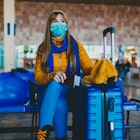
Jan 21, 2022 • 4 min read
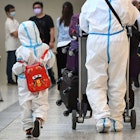
Nov 30, 2021 • 6 min read

Nov 15, 2021 • 2 min read
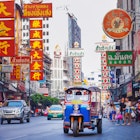
Sep 27, 2021 • 3 min read
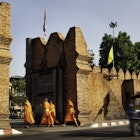
Apr 19, 2024 • 7 min read

Apr 8, 2024 • 6 min read

Feb 23, 2024 • 7 min read
Thailand Travel Restrictions
Traveler's COVID-19 vaccination status
Traveling from the United States to Thailand
Open for vaccinated visitors
COVID-19 testing
Not required
Not required for vaccinated visitors
Restaurants
Recommended in public spaces.
Thailand entry details and exceptions
Documents & additional resources, ready to travel, find flights to thailand, find stays in thailand, explore more countries on travel restrictions map, destinations you can travel to now, dominican republic, netherlands, philippines, puerto rico, switzerland, united arab emirates, united kingdom, know when to go.
Sign up for email alerts as countries begin to open - choose the destinations you're interested in so you're in the know.
Can I travel to Thailand from the United States?
Most visitors from the United States, regardless of vaccination status, can enter Thailand.
Can I travel to Thailand if I am vaccinated?
Fully vaccinated visitors from the United States can enter Thailand without restrictions.
Can I travel to Thailand without being vaccinated?
Unvaccinated visitors from the United States can enter Thailand without restrictions.
Do I need a COVID test to enter Thailand?
Visitors from the United States are not required to present a negative COVID-19 PCR test or antigen result upon entering Thailand.
Can I travel to Thailand without quarantine?
Travelers from the United States are not required to quarantine.
Do I need to wear a mask in Thailand?
Mask usage in Thailand is recommended in public spaces.
Are the restaurants and bars open in Thailand?
Restaurants in Thailand are open. Bars in Thailand are .
We’re sorry, this site is currently experiencing technical difficulties. Please try again in a few moments. Exception: request blocked
Update April 12, 2024
Information for u.s. citizens in the middle east.
- Travel Advisories |
- Contact Us |
- MyTravelGov |
Find U.S. Embassies & Consulates
Travel.state.gov, congressional liaison, special issuance agency, u.s. passports, international travel, intercountry adoption, international parental child abduction, records and authentications, popular links, travel advisories, mytravelgov, stay connected, legal resources, legal information, info for u.s. law enforcement, replace or certify documents.
Before You Go
Learn About Your Destination
While Abroad
Emergencies
Share this page:
Travel Advisory July 24, 2023
Thailand - level 1: exercise normal precautions.
Reissued with obsolete COVID-19 page links removed.
Exercise normal precautions in Thailand. Some areas have increased risk. Read the entire Travel Advisory.
Reconsider travel to:
- Yala, Pattani, Narathiwat, and Songkhla provinces due to civil unrest associated with ongoing insurgent activities.
Read the country information page for additional information on travel to Thailand.
If you decide to travel to Thailand:
- Enroll in the Smart Traveler Enrollment Program (STEP) to receive Alerts and make it easier to locate you in an emergency.
- Follow the Department of State on Facebook and Twitter .
- Review the Country Security Report for Thailand.
- Have evacuation plans that do not rely on U.S. government assistance.
- Visit the CDC page for the latest Travel Health Information related to your travel.
- Prepare a contingency plan for emergency situations. Review the Traveler’s Checklist .
Yala, Pattani, Narathiwat, and Songkhla Provinces – Level 3: Reconsider Travel
Periodic violence directed mostly at Thai government interests by a domestic insurgency continues to affect security in the southernmost provinces of Yala, Pattani, Narathiwat, and Songkhla. In Songkhla, the insurgency is most active in the districts of Chana, Thepha, Nathawat, and Saba Yoi. U.S. citizens are at risk of death or injury due to the possibility of indiscriminate attacks in public places.
The U.S. government has limited ability to provide emergency services to U.S. citizens in these provinces as U.S government employees must obtain special authorization to travel to these provinces.
Visit our website for Travel to High-Risk Areas .
Embassy Messages
View Alerts and Messages Archive
Quick Facts
6 months from date of entry required
One page is required per entry stamp; please note endorsement pages are not considered blank passport page
No, if your stay is less than 30 days
Yellow fever may be required if arriving from certain countries with yellow fever
Embassies and Consulates
U.S. Embassy Bangkok 95 Wireless Road Bangkok 10330 Thailand Telephone: + (66) (2) 205-4049, 02-205-4049 (within Thailand) Emergency After-Hours Telephone: +(66) (2) 205-4000, 02-205-4000 (within Thailand) Fax: +(66) (2) 205-4103, 02-205-4103 (within Thailand) Email: [email protected]
CONSULATE
U.S. Consulate General Chiang Mai 387 Witchayanond Road Chiang Mai 50300 Thailand Telephone: +(66) (53) 107-777, 053-107-777 (within Thailand) Emergency After-Hours Telephone: +(66) 81-881-1878, 081-881-1878 (within Thailand) Fax: +(66) (53) 252-633, 053-252-633 (within Thailand) Email: [email protected]
Destination Description
Learn about the U.S. relationship to countries around the world.
Entry, Exit and Visa Requirements
Visit the Royal Thai Embassy website for the most current visa information.
- U.S. citizen tourists entering Thailand for fewer than 30 days do not require a visa.
- We strongly recommend that your passport be valid for at least six months beyond the date of your arrival in Thailand to avoid possible denied entry.
- Thai immigration officials or airline staff may ask for your onward/return ticket.
- Business travelers, U.S. government employees travelling on official business, teachers, retirees, and those planning to stay longer than 30 days should check with the Royal Thai Embassy about visa requirements .
- If you overstay your visa, you will be fined. Depending on the length of overstay, you may also be arrested, detained, deported at your own expense, and banned from re-entering Thailand.
We strongly recommend you carry a copy of your U.S. passport identification page and current Thai visa to help avoid detention by the Thai immigration police.
Thailand’s entry/exit information is subject to change without notice. For the most current information, please see The Royal Thai Police Immigration Bureau .
You can find detailed information on vaccinations and other health precautions on the CDC website .
HIV/AIDS Restrictions: Some HIV/AIDS entry restrictions exist for visitors to and foreign residents of Thailand. However, these restrictions are generally not enforced. Please verify this information with the Royal Thai Embassy before you travel.
Find information on dual nationality , prevention of international child abduction and customs regulations on our websites.
COVID-19 Requirements: There are no COVID-related entry requirements for U.S. citizens.
Safety and Security
Terrorism: Terrorist groups and those inspired by such organizations are intent on attacking U.S. citizens abroad. Terrorists are increasingly using less sophisticated methods of attack – including knives, firearms, and vehicles – to more effectively target crowds. Frequently, their aim is unprotected or vulnerable targets, such as:
- High-profile public events (sporting contests, political rallies, demonstrations, holiday events, celebratory gatherings, etc.)
- Hotels, clubs, and restaurants frequented by tourists
- Places of worship
- Shopping malls and markets
- Public transportation systems (including subways, buses, trains, and scheduled commercial flights)
For more information, see our Terrorism page.
Periodic acts of violence in Thailand remain a concern. In August 2019, several small explosions and related arson events occurred in various locations throughout Bangkok resulting in no deaths but some injuries and minor property damage. Several small-scale bombings occurred near some tourist locations in the far Southern provinces in August 2016 and December 2018. In August 2015, an explosion near the Erawan Shrine in downtown Bangkok killed at least 20 people and injured more than 100. The U.S. Department of State assesses there is a continued risk of terrorism in Southeast Asia, including in Thailand.
If a protest or demonstration is expected to pass near the U.S. Embassy or Consulate facilities, Embassy and Consulate entrances and functions may be restricted. The U.S. Embassy in Bangkok’s website , Facebook, and Twitter sites and the U.S. Consulate General in Chiang Mai’s website , Facebook , and Twitter sites post information about local events that may affect Embassy functions. Enroll in the Smart Traveler Enrollment Program ( STEP ) to receive security and safety messages.
Far Southern Thailand: Periodic violence directed mostly at Thai government interests by a domestic insurgency continues to affect security in the southernmost provinces of Yala, Pattani, Narathiwat, and Songkhla. U.S. citizens are at risk of death or injury due to the possibility of indiscriminate attacks in public places. Martial law is in force in this region.
The U.S. government has limited ability to provide emergency services to U.S. citizens in these provinces. Travel to this region by U.S government employees must be reviewed and approved in advance. For more information on terrorist threats against U.S. citizens worldwide and steps to take as a result of these threats, please see the Worldwide Caution .
- Crimes of opportunity, such as pick-pocketing, bag-snatching, and burglary, occur in Thailand.
- Violent crimes against foreigners are relatively rare. However, murders, rapes, and assaults against foreigners do occur.
- Sexually motivated violence, committed by either Thai citizens or foreigners, is most likely to occur after time spent at bars, clubs, and parties, on beaches, or in remote/isolated areas. The Thai police response will differ from an investigation in the United States; investigating officials have publicly discredited people who have reported being the victim of crimes . In addition to making a report at the police jurisdiction in which the crime occurred, we advise contacting the Embassy and engaging a local attorney if you are a victim of an assault.
- When traveling alone, exercise caution, stay near other travelers, and ensure friends or family know how to contact you.
- Taxi and “tuk-tuk” drivers may attempt to charge excessive fares or refuse passengers. You should either request the driver use the meter or agree on the fare beforehand.
- At the airport use only public transportation from the airport’s official pick-up area, cars from the limousine counters, or a car from your hotel.
- Rental scams do occur in Thailand. Many rental motorbike, jet ski, and car companies will hold your passport until you pay for real or fictitious damages. We advise against using your passport as collateral.
- Exorbitant bar tab scams occur in Thailand. Some bars and entertainment venues will charge exorbitant prices for drinks or unadvertised cover charges and threaten violence if you don’t pay.
- Other scams involving gems, city tours, entertainment venues, and credit cards are common, especially in tourist areas.
International Financial Scams: See the Department of State and the FBI pages for information.
Internet romance and financial scams are prevalent in Thailand. Scams are often initiated through Internet postings/profiles or by unsolicited emails and letters. Scammers almost always pose as U.S. citizens who have no one else to turn to for help. Common scams include:
- Romance/Online dating
- Money transfers
- Grandparent/Relative targeting
- Free Trip/Luggage
- Work permits/job offers
Victims of Crime: U.S. citizen victims of crime are encouraged to contact the U.S. Embassy or Consulate for assistance. Report crimes to the local police by calling 191 or the Tourist Police at 1155 and contact the U.S. Embassy at +66 (0) 2-205-4049 or Consulate at +(66) (53) 107-777. Remember that only local officials have the authority to investigate and to prosecute a crime.
Domestic Violence: U.S. citizen victims of domestic violence are encouraged to contact the U.S. Embassy or Consulate for assistance. Report crimes to the local police by calling 191 or the Tourist Police at 1155 and contact the U.S. Embassy at +66 (0) 2-205-4049 or Consulate at +(66) (53) 107-777. Remember that only local officials have the authority to investigate and to prosecute a crime.
See our webpage on help for U.S. victims of crime overseas .
- Help you find appropriate medical care
- Assist you in reporting a crime to the police
- Contact relatives or friends with your written consent
- Explain the local criminal justice process in general terms
- Provide a list of local attorneys
- Provide our information on victim’s compensation programs in the U.S.
- Provide an emergency loan for repatriation to the United States and/or limited medical support in cases of destitution
- Help you find accommodation and arrange flights home
- Replace a stolen or lost passport
Tourism: The tourism industry is unevenly regulated, and safety inspections for equipment and facilities do not commonly occur. Hazardous areas/activities are not always identified with appropriate signage, and staff may not be trained or certified either by the host government or by recognized authorities in the field. In the event of an injury, appropriate medical treatment is typically available only in/near major cities. First responders are generally unable to access areas outside of major cities and to provide urgent medical treatment. U.S. citizens are encouraged to purchase medical evacuation insurance. See our webpage for more information on insurance providers for overseas coverage .
Local Laws & Special Circumstances
Criminal Penalties: You are subject to local laws. If you violate local laws, even unknowingly, you may be expelled, arrested, or imprisoned. Individuals establishing a business or practicing a profession that requires additional permits or licensing should seek information from the competent local authorities, prior to practicing or operating a business.
Furthermore, some laws are also prosecutable in the United States, regardless of local law. For examples, see our website on crimes against minors abroad and the Department of Justice website.
Arrest Notification: If you are arrested or detained, ask police or prison officials to notify the U.S. Embassy immediately. See our webpage for further information.
Conditions at the Bangkok Immigration Detention Center (IDC): Conditions in immigration detention centers (IDCs) where authorities detain foreign nationals who violate immigration laws remain poor and most are overcrowded. IDCs, administered by the Immigration Police Bureau, which reports to the Royal Thai Police (RTP), are not subject to many of the regulations that govern the regular prison system. U.S. citizen detainees often complain of stark, austere living conditions, overcrowding, and unhealthy conditions. Personal security is poor. In addition, the main IDC in Bangkok does not dependably provide adequate medical or mental health care. In 2019, two U.S. citizens died while in custody at the Bangkok IDC. Deportations are self-funded and it may take up to two weeks for Thai authorities to process a case before deportation. Detainees must have funds to purchase a phone card and do not have access to the internet. Prior approval and a security escort are required to visit a Western Union or an ATM machine.
- Please see the Immigration Act B.E. 1979 for more information about Thai Immigration violations.
- Please see the Department of State’s Report on Human Rights Practices for Thailand for further information.
Lèse majesté (Royal Insult): Thais hold the monarchy in the highest regard. Making a critical or defamatory comment about the royal family is punishable by a prison sentence of up to 15 years per offense. As an example, purposely tearing Thai bank notes, which carry an image of the King, may be considered a lèse majesté offense.
- Prostitution is illegal in Thailand. Serious consequences include criminal conviction and imprisonment, particularly in the case of child prostitution.
- Commercial surrogacy is banned.
- Personal use of even non-lethal military equipment, such as protective vests and night vision scopes, is prohibited.
- Illegal drugs carry severe penalties. Expect long jail sentences under harsh conditions, heavy fines, or even execution for possessing, using, or trafficking in illegal drugs.
- Shoplifting can result in large fines and lengthy detention followed by deportation.
- Domestic Issues: Local police are reluctant to become involved in domestic issues. You may call the Family Services Emergency hotline by dialing 1300 from any Thai phone.
- Possessing counterfeit or pirated goods is a crime in Thailand. For more information see the intellectual property section of the U.S. Department of Justice website .
Customs may enforce strict regulations on Buddha images, firearms, bullets and/or bullet casings, bullet-proof vests, night vision devices and other para-military type equipment, explosives, drugs, radios, books, and recordings, which might be cultural property and/or considered harmful to the public interest.
Faith-Based Travelers: See the following webpages for details:
- Faith-Based Travel Information
- International Religious Freedom Report – see country reports
- Human Rights Report – see country reports
- Hajj Fact Sheet for Travelers
- Best Practices for Volunteering Abroad
LGBTI Travelers: There are no known legal restrictions on same-sex sexual relations or the organization of LGBTI events in Thailand. However, LGBTI groups report that in the case of sexual crimes, police tend to downplay sexual abuse claims from LGBTI victims.
See our LGBTI Travel Information page and section 6 of our Human Rights report for further details.
Travelers Who Require Accessibility Assistance. Sidewalks and street crossings are not suitable for travelers with mobility issues. Newly constructed buildings, facilities, and transportation equipment should be accessible by law for persons with mobility issues. However, enforcement of these provisions is not uniform.
Students: See our Students Abroad page and FBI travel tips .
Women Travelers: Some victims of sexual assault or domestic violence find that Thai authorities do not handle such cases with as much sensitivity or consideration for privacy as they would expect in the United States. See our travel tips for Women Travelers .
Ambulance services are:
- not present throughout the country or are unreliable in most areas except for Bangkok and other major cities.
- Injured or seriously ill travelers may prefer to take a taxi or private vehicle to the nearest major hospital rather than wait for an ambulance.
Medical treatment is generally adequate in Thailand’s urban areas. In Bangkok, Chiang Mai, Phuket, and Pattaya, good facilities exist for routine, long-term, and emergency health care. Basic medical care is available in rural areas, but English-speaking providers are rare.
Medical tourism is an established and rapidly growing industry. You should consult with your local physician before traveling and also refer to information on medical tourism from CDC.
We do not pay medical bills. Be aware that U.S. Medicare/Medicaid does not apply overseas. Most hospitals and doctors overseas do not accept U.S. health insurance.
Medical Insurance: Make sure your health insurance plan provides coverage overseas. Most care providers overseas only accept cash payments. See our webpage for more information on insurance providers for overseas coverage. Visit the U.S. Centers for Disease Control and Prevention for more information on type of insurance you should consider before you travel overseas.
We strongly recommend supplemental insurance to cover medical evacuation.
Medicine for personal use is allowed as long as the amount does not exceed a 30-day supply and you bring the medicine with you. Do not mail medicine to Thailand without first confirming it will be allowed into the country.
If traveling with prescription medication, check with Thailand Customs and the Thailand Food and Drug Administration to ensure the medication is legal in Thailand. Always, carry your prescription medication in original packaging with your doctor’s prescription.
The following diseases are present:
- Chikungunya
- Japanese encephalitis
- Tuberculosis:
- Hepatitis A and B
- Melioidosis
Vaccinations: Be up-to-date on all vaccinations recommended by the U.S. Centers for Disease Control and Prevention.
Further health information:
- World Health Organization
- U.S. Centers for Disease Control and Prevention (CDC)
Air Quality: The air quality in Thailand varies considerably and fluctuates with the seasons, but seasonal smog is a problem. In recent years the air quality in Bangkok, Chiang Mai, Khon Kaen, Lampang, Nan, and Samut Sakhon have exceeded Thai and U.S. government daily standards for fine particulate matter (PM 2.5) for a portion of the year. In Chiang Mai and other northern provinces, annual agricultural burning, approximately February through late April, and forest fires cause days with unhealthy to hazardous air quality based on the U.S. index. In Bangkok environs, airborne dust and auto pollutants are prevalent in the cooler, dry period (December-February). Anyone who travels where pollution levels are high is at risk. People at the greatest risk from air pollution exposure include:
- Infants, children, and teens
- People over 65 years of age
- People with lung disease such as asthma and chronic obstructive pulmonary disease (COPD), which includes chronic bronchitis and emphysema;
- People with heart disease
- People who work or are active outdoors
For Bangkok and Chiang Mai, U.S. Mission Thailand is reporting the U.S. EPA’s Air Quality Index (AQI) calculated from PM2.5 data captured by monitors owned and maintained by the Royal Thai Government. The information and advice on health protection measures to take is available
Visit AirNow Department of State for information on air quality at U.S. Embassies and Consulates.
The U.S. Embassy maintains a list of doctors and hospitals . We do not endorse or recommend any specific medical provider or clinic.
Health facilities in general:
- Adequate health facilities are available in Bangkok and other major cities but health care in rural areas may be below U.S. standards.
- Hospitals and doctors require payment “up front” prior to service or admission. Credit card payment is not always available.
- Medical staff at public hospitals may speak little or no English.
- Patients bear all costs for transfer to or between hospitals.
- Psychological and psychiatric services are limited, even in the larger cities, with hospital-based care only available through government institutions.
Medical Tourism and Elective Surgery:
- Medical tourism is a rapidly growing industry. People seeking health care overseas should understand that medical systems operate differently from those in the United States and are not subject to the same rules and regulations. Anyone interested in traveling for medical purposes should consult with their local physician before traveling and visit the U.S. Centers for Disease Control and Prevention website for more information on Medical Tourism.
- We strongly recommend supplemental insurance to cover medical evacuation in the event of unforeseen medical complications.
- Your legal options in case of malpractice are very limited in Thailand.
- Although Thailand has many elective/cosmetic surgery facilities that are on par with those found in the United States, the quality of care varies widely. If you plan to undergo surgery in Thailand, make sure that emergency medical facilities are available and professionals are accredited and qualified.
Pharmaceuticals:
- Exercise caution when purchasing medication overseas. Pharmaceuticals, both over the counter and requiring prescription in the United States, are often readily available for purchase with little controls. Counterfeit medication is common and may prove to be ineffective, the wrong strength, or contain dangerous ingredients. Medication should be purchased in consultation with a medical professional and from reputable establishments.
- U.S. Customs and Border Protection and the Food and Drug Administration are responsible for rules governing the transport of medication back to the United States. Medication purchased abroad must meet their requirements to be legally brought back into the United States. Medication should be for personal use and must be approved for usage in the United States. Please visit the U.S. Customs and Border Protection and the Food and Drug Administration websites for more information.
Assisted Reproductive Technology and Surrogacy:
- If you are considering traveling to Thailand to have a child through use of assisted reproductive technology (ART) or surrogacy, please see our ART and Surrogacy Abroad page .
- Surrogacy is illegal for foreigners in Thailand, subject to complex local regulation. For additional information, visit the Government of Thailand’s website for information on foreigner surrogacy.
- If you decide to pursue parenthood in Thailand via assisted reproductive technology (ART) with a gestational mother, be prepared for long and unexpected delays in documenting your child’s citizenship. Be aware that individuals who attempt to circumvent local law risk criminal prosecution.
Water Quality:
- In many areas, tap water is not potable. Bottled water and beverages are generally safe, although you should be aware that many restaurants and hotels serve tap water unless bottled water is specifically requested. Be aware that ice for drinks may be made using tap water.
Adventure Travel:
- Visit the U.S. Centers for Disease Control and Prevention website for more information about Adventure Travel .
COVID-19 Testing: For the most current list of COVID-19 testing locations in Thailand approved by the Ministry of Public Health, please visit: http://service.dmsc.moph.go.th/labscovid19 . Testing is paid for by U.S. citizens.
The Ministry of Public Health provides a list of 44 laboratories approved to conduct COVID-19 testing found here .
Please Note : Same-day Covid-19 testing is available at most private hospitals throughout Thailand. Please reference this list of testing locations and contact the provider directly to inquire about COVID-19 testing options, scheduling, cost, and other information.
COVID-19 Vaccines: The COVID-19 vaccine is available for U.S. citizens to receive in Thailand. According to Thai authorities, both private and public hospitals are providing COVID-19 vaccines. More information on a list of hospitals in Thailand is available here .
The Bang Rak Vaccination and Health Center, the Institute of Dermatology, and the Bamrasnaradura Infectious Diseases Institute are currently providing free bivalent vaccines to non-Thai citizens on a walk-in basis.
Visit the FDA's website to learn more about FDA-approved vaccines in the United States.
Travel and Transportation
Road Conditions and Safety:
- Traffic accidents are common in Thailand. According to the World Health Organization , in 2018, Thailand had one of the world’s highest traffic-related fatality rates. Bangkok and some parts of Chiang Mai have heavy traffic.
- Reckless driving: Speeding, reckless passing, and failure to obey other traffic laws are common in all regions of Thailand. Traffic moves on the left. Some drivers move illegally against the traffic. Scooters and motorbikes commonly drive on the sidewalks during rush hour and other periods of heavy traffic. Commercial drivers commonly consume alcohol, amphetamines, and other stimulants.
- Accidents involving motorcycles can be deadly . Riders may incur serious injuries when they are not wearing helmets or proper clothing and footwear. According to the World Health Organization, in 2016, 74 percent of traffic fatalities involved riders of 2-and 3-wheeled vehicles. Use of motorcycle helmets is mandatory, but this law is sporadically enforced.
- Use a pedestrian bridge to cross the road where one is available, including in front of the U.S. Embassy on Wireless Road and on Sukhumvit Road, where many pedestrians have been killed and several U.S. citizens seriously injured. Look carefully in both directions before crossing streets, even when using a marked crosswalk.
- If you have a traffic accident, you should contact your insurance company for guidance in dealing with the other party and the police.
- Emergency vehicles: Congested roads and a scarcity of ambulances can make it difficult for accident victims to receive timely medical attention
Traffic Laws:
- Driving under influence is punishable by law . If you are found to be intoxicated, you could be jailed for a minimum of two years and subject to a fine.
- Bribes are illegal. If you are found guilty, you could be imprisoned up to five years, face severe fines, or both.
- Lack of ID.
- Not obeying traffic laws and traffic signals.
- Driving slowly in regular lanes of traffic.
- If you are involved in a traffic accident, you should contact your auto insurance company for guidance .
Public Transportation:
- Mass transit: In Bangkok, the BTS elevated "Skytrain," “Airport Rail Link” mass transit, and the underground MRT systems are reliable, inexpensive, air conditioned, and often faster than Bangkok traffic.
- Bus system: Bangkok also has an extensive bus system, but buses can be overcrowded and are often driven with little or no regard for passenger safety.
- For hire vehicles: Cities outside of Bangkok typically have only rudimentary public transportation and usually do not have metered taxis. In many cases, motorcycle taxis, tuk-tuks, bicycle-powered rickshaws, and pick-up trucks will be the only options available for travelers without their own transport.
- Smartphone-based for-hire vehicle service exist in Bangkok and other large cities. Those affiliated with registered taxis, such as Grab Taxi, Line Taxi, and All Thai Taxi are legal, but their affiliated car services are under legal review.
See our Road Safety page for more information.
Aviation Safety Oversight: The U.S. Federal Aviation Administration (FAA) has assessed the government of Thailand’s Civil Aviation Authority as not being in compliance with International Civil Aviation Organization (ICAO) aviation safety standards for oversight of Thailand’s air carrier operations. Further information may be found on the FAA’s safety assessment page .
Maritime Travel: Mariners planning travel to Thailand should also check for U.S. maritime advisories and alerts . Information may also be posted to the U.S. Coast Guard homeport website , and the NGA broadcast warnings .
For additional travel information
- Enroll in the Smart Traveler Enrollment Program (STEP) to receive security messages and make it easier to locate you in an emergency.
- Call us in Washington, D.C. at 1-888-407-4747 (toll-free in the United States and Canada) or 1-202-501-4444 (from all other countries) from 8:00 a.m. to 8:00 p.m., Eastern Standard Time, Monday through Friday (except U.S. federal holidays).
- See the State Department’s travel website for the Worldwide Caution and Travel Advisories .
- Follow us on Twitter and Facebook .
- See traveling safely abroad for useful travel tips.
Review information about International Parental Child Abduction in Thailand . For additional IPCA-related information, please see the International Child Abduction Prevention and Return Act ( ICAPRA ) report.

Travel Advisory Levels
Assistance for u.s. citizens, thailand map, learn about your destination, enroll in step.

Subscribe to get up-to-date safety and security information and help us reach you in an emergency abroad.
Recommended Web Browsers: Microsoft Edge or Google Chrome.
Make two copies of all of your travel documents in case of emergency, and leave one with a trusted friend or relative.
Afghanistan
Antigua and Barbuda
Bonaire, Sint Eustatius, and Saba
Bosnia and Herzegovina
British Virgin Islands
Burkina Faso
Burma (Myanmar)
Cayman Islands
Central African Republic
Cote d Ivoire
Curaçao
Czech Republic
Democratic Republic of the Congo
Dominican Republic
El Salvador
Equatorial Guinea
Eswatini (Swaziland)
Falkland Islands
France (includes Monaco)
French Guiana
French Polynesia
French West Indies
Guadeloupe, Martinique, Saint Martin, and Saint Barthélemy (French West Indies)
Guinea-Bissau
Isle of Man
Israel, The West Bank and Gaza
Liechtenstein
Marshall Islands
Netherlands
New Caledonia
New Zealand
North Korea (Democratic People's Republic of Korea)
Papua New Guinea
Philippines
Republic of North Macedonia
Republic of the Congo
Saint Kitts and Nevis
Saint Lucia
Saint Vincent and the Grenadines
Sao Tome and Principe
Saudi Arabia
Sierra Leone
Sint Maarten
Solomon Islands
South Africa
South Korea
South Sudan
Switzerland
The Bahamas
Timor-Leste
Trinidad and Tobago
Turkmenistan
Turks and Caicos Islands
United Arab Emirates
United Kingdom
Vatican City (Holy See)
External Link
You are about to leave travel.state.gov for an external website that is not maintained by the U.S. Department of State.
Links to external websites are provided as a convenience and should not be construed as an endorsement by the U.S. Department of State of the views or products contained therein. If you wish to remain on travel.state.gov, click the "cancel" message.
You are about to visit:
- Election 2024
- Entertainment
- Newsletters
- Photography
- Personal Finance
- AP Investigations
- AP Buyline Personal Finance
- AP Buyline Shopping
- Press Releases
- Israel-Hamas War
- Russia-Ukraine War
- Global elections
- Asia Pacific
- Latin America
- Middle East
- Election Results
- Delegate Tracker
- AP & Elections
- Auto Racing
- 2024 Paris Olympic Games
- Movie reviews
- Book reviews
- Personal finance
- Financial Markets
- Business Highlights
- Financial wellness
- Artificial Intelligence
- Social Media
Thailand tightens entry requirements due to omicron spread
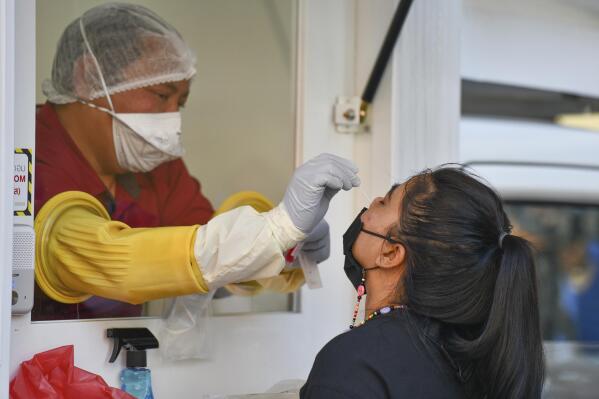
A health worker conducts a nasal swab on an individual undergoing a coronavirus test in Khaosan road Thursday, Jan. 6, 2022 in Bangkok. Thailand reported its biggest spike in coronavirus cases in weeks on Thursday after a holiday season in which people traveled and gathered in large numbers amid the rapid spread of the omicron variant.(AP Photo/Vichan Poti)
Workers wear face masks and practice social distancing while they wait to be tested for the coronavirus at Khaosan road Thursday, Jan. 6, 2022, in Bangkok. Thailand reported its biggest spike in coronavirus cases in weeks on Thursday after a holiday season in which people traveled and gathered in large numbers amid the rapid spread of the omicron variant. (AP Photo/Vichan Poti)
- Copy Link copied
BANGKOK (AP) — Thailand announced Friday it is tightening some entry restrictions while expanding its “sandbox” quarantine program, and urged people to follow social distancing and mask rules to control the spread of COVID-19 fueled by the omicron variant.
The government did not announce any lockdown, but issued restrictions on alcohol consumption in restaurants. It also called on people to avoid public gatherings, public transportation and travel around the country. Most schools will stay open, while bars and nightclubs will remain closed.
The decision came after reported daily coronavirus cases doubled to 7,526 in a matter of days following the new year’s holiday, mostly because of the omicron variant. Nineteen new deaths were recorded, the government said.
The Center for COVID-19 Situation Administration, or CCSA, said it has indefinitely suspended the country’s “test-and-go” program, under which foreign tourists could quarantine for only one night while awaiting test results, and that people already approved under the scheme can only enter the kingdom until Jan. 15.
CCSA spokesperson Taweesin Witsanuyothin said all other people arriving in Thailand must either go into hotel quarantine or use the “sandbox” program. He said the program will be extended next Tuesday from the island of Phuket to the provinces of Pang-nga and Krabi and three islands in Surat Thai province — Koh Samui, Koh Tao and Koh Phangan.
He said travel restrictions imposed on eight African countries will also be lifted that day.
Under the “sandbox” program, fully vaccinated people are allowed to enter specific locations such as Phuket. They must spend a week in an approved hotel, have one test on arrival and another a week later. Although their movements are tracked, they can move around freely.
The “test-and-go” scheme allowed fully vaccinated people to enter Thailand, but they were subject to a coronavirus test on arrival and a second test seven days later. If the first test was negative, they could travel freely. They had to spend their first night in a government-approved hotel awaiting their test results.
Thailand had by far the most ambitious program in the region to allow travelers to enter and move around the country. It eased restrictions after a successful vaccination program in which 100 million doses have been administered to its population of about 60 million people. Booster programs are underway around the country.
We've detected unusual activity from your computer network
To continue, please click the box below to let us know you're not a robot.
Why did this happen?
Please make sure your browser supports JavaScript and cookies and that you are not blocking them from loading. For more information you can review our Terms of Service and Cookie Policy .
For inquiries related to this message please contact our support team and provide the reference ID below.

This website is managed by Siam Legal International - a law firm in Thailand
Thailand Travel Updates for May 1, 2022; New Entry Requirements for Thailand; Updated Step-by-Step Thailand Pass Application
This Weekly Update was originally posted on April 29, 2022. For the most recent update, click here .
To sign-up for our Weekly Updates, please click here .
Thailand Travel Updates for May 1, 2022
Thailand is easing its entry requirements and Thailand Pass process from the 1st of May, 2022.
How a traveler enters Thailand will depend on their vaccination status.
What is changing?
There are 4 major changes:
- The Test & Go and Sandbox schemes are being removed for vaccinated travelers. It has been replaced with the No Quarantine program.
- RT-PCR testing is no longer required when entering Thailand.
- COVID-19 insurance is reduced from $20,000 USD to $10,000 USD
- Unvaccinated travelers can enter Thailand by 5-day Alternate Quarantine or a No Quarantine program if they have a pre-departure RT-PCR test.
What is staying the same?
- All visitors must have an approved Thailand Pass to enter Thailand.
- All visitors need a COVID-19 insurance policy for the duration of their stay.
Vaccinated travelers will apply for a Thailand Pass and include:
- Passport profile page
- Flight itinerary to confirm the arrival date
- A certificate of full (2 doses) vaccination
- A COVID-19 insurance policy with USD$10,000 minimum coverage
Unvaccinated travelers will apply for a Thailand Pass and include:
- Flight itinerary to confirm arrival date in Thailand
- A COVID-19 insurance policy with USD$ 10,000 minimum coverage
- Alternate Quarantine hotel booking for 5 nights (Quarantine program), OR
- An RT-PCR test result no older than 72 hours before the departure date (No Quarantine) in lieu of a vaccination certificate
Changes for children under the age of 18:
- Can be added to a parent or guardians Thailand Pass and will enter Thailand under the same method as the parent.
- Do not need to be vaccinated.
- Do not have to do a pre-departure COVID-19 test or test on arrival.
Travelers may join the conversation in our Facebook Group to ask questions and read the latest developments. https://www.facebook.com/groups/howtoenterthailand
Step-by-Step Guide for Thailand Pass Application
Thailand has recently reopened the country to travelers, both Thais and foreigners whether vaccinated or unvaccinated. In this newsletter, you will learn about the Step-by-Step Process in Applying for a Thailand Pass.
Step 1: Visit the official Thailand Pass website
You may go to the official website: https://tp.consular.go.th/
Once there, you may choose the option of Non-Thai Nationals or Thai Nationals.
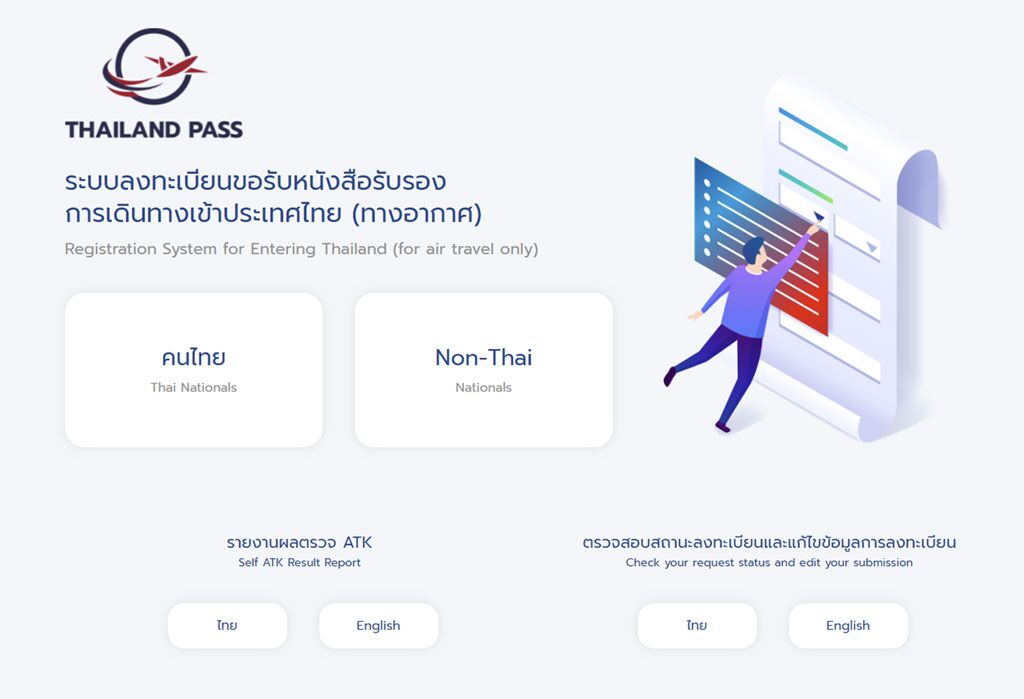
After that you will be directed to a page where you can choose the entry program:
No Quarantine program for fully vaccinated travelers entering any international airport in Thailand or unvaccinated who have RT PCR test results. Unvaccinated children below 18 years old must be added to their parent’s application.
Alternative Quarantine program for partially vaccinated and unvaccinated travelers who will undergo mandatory quarantine
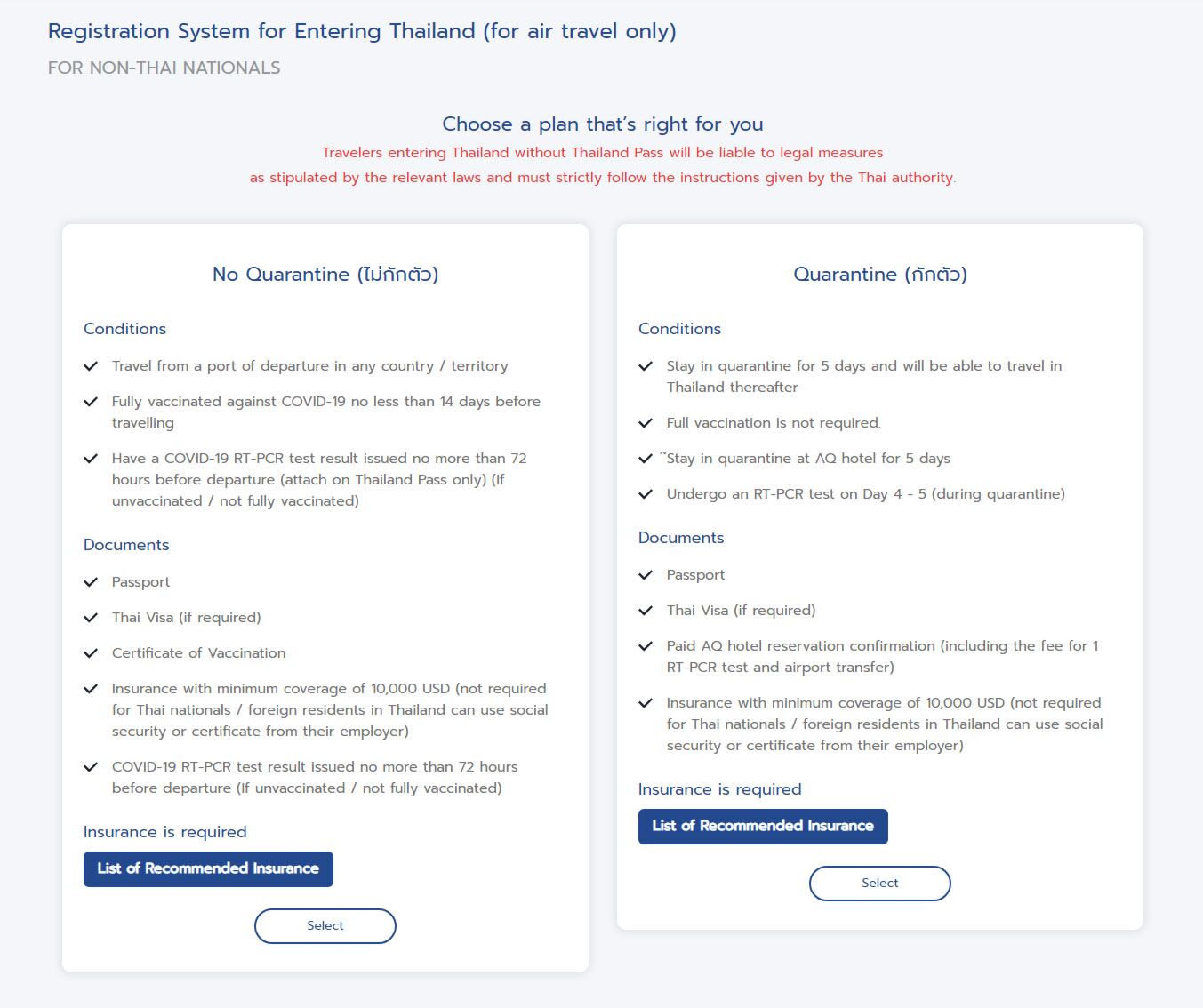
Step 2: Details of your Arrival
In this part, you will provide the purpose of travel to Thailand whether for tourism or if you are a returning resident.
You will also provide your country of departure, airport of arrival, flight number, date of arrival, and proposed exit date from Thailand.
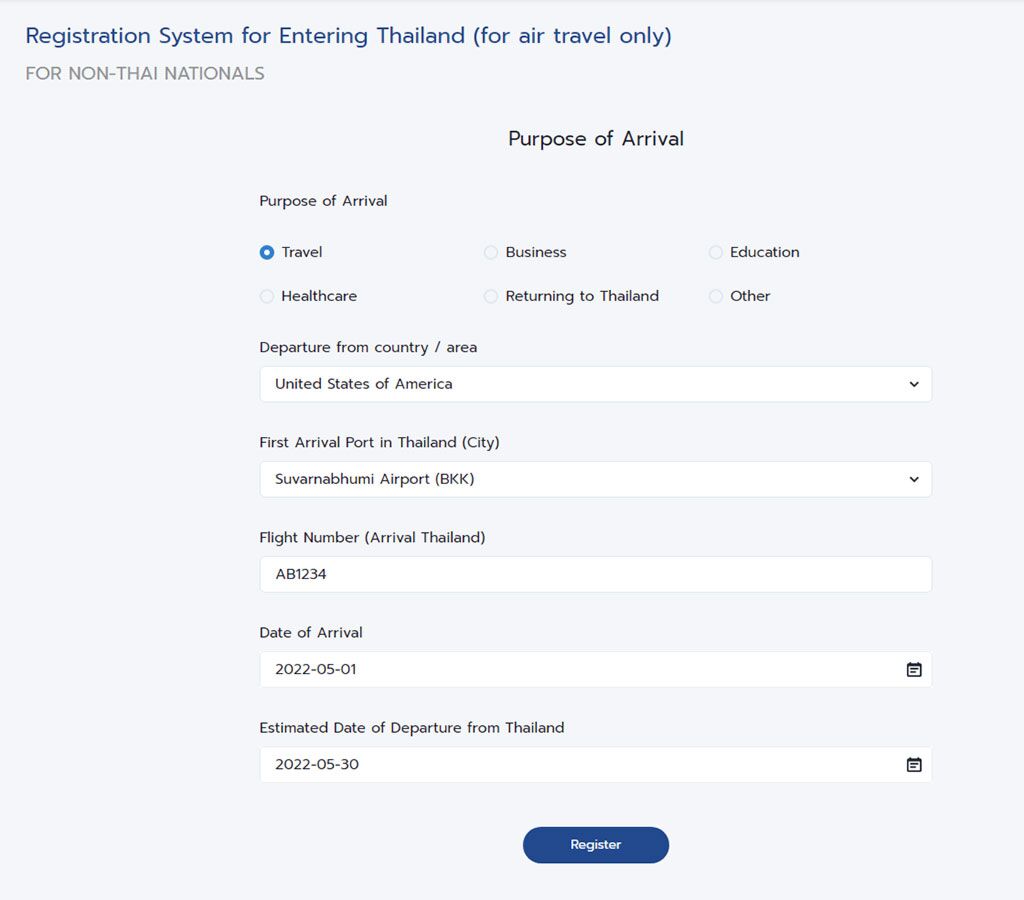
Step 3. Provide your Personal Information
In this part, you will provide your full name as stated in your passport or travel document, nationality, passport number, date of birth, and email address. Please make sure that you check the correct spelling of your personal information before you proceed to the next step. It is also recommended to use a GMAIL email account when applying for Thailand Pass.
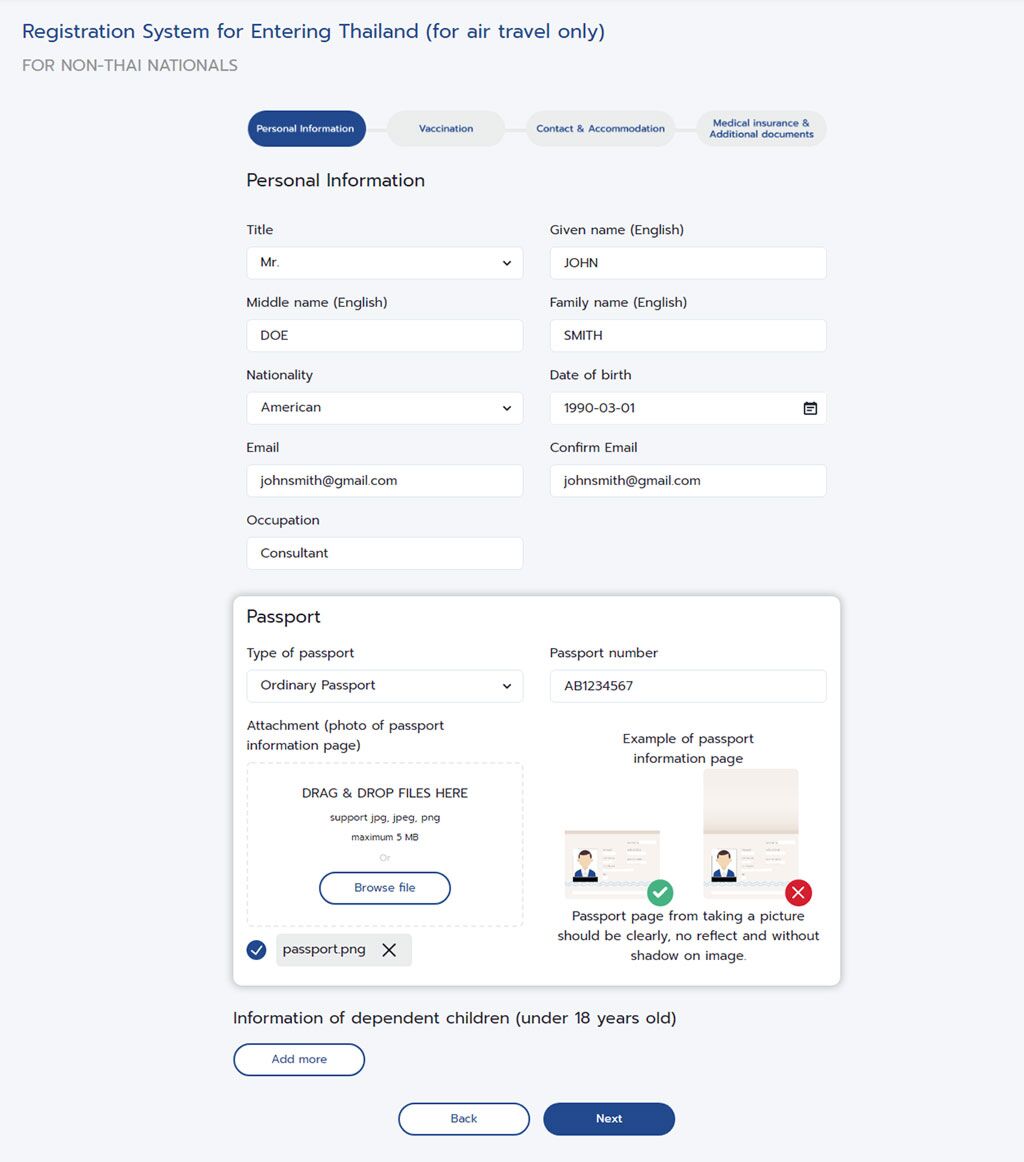
Step 4. Upload Proof of Vaccination or RT PCR Test
In this part, you will provide your vaccination information. You will provide the name or brand of your vaccination and also the date of vaccination. You will be able to upload a JPG or PNG file of your proof of vaccination.
For faster processing of your Thailand Pass, it is recommended to also upload the QR code of your vaccination document if it is available.
Note: If you are applying under the No Quarantine Program and you are not fully vaccinated, you may upload a copy of your RT PCR test result in lieu of a vaccination certificate issued within 72 hours before departure.
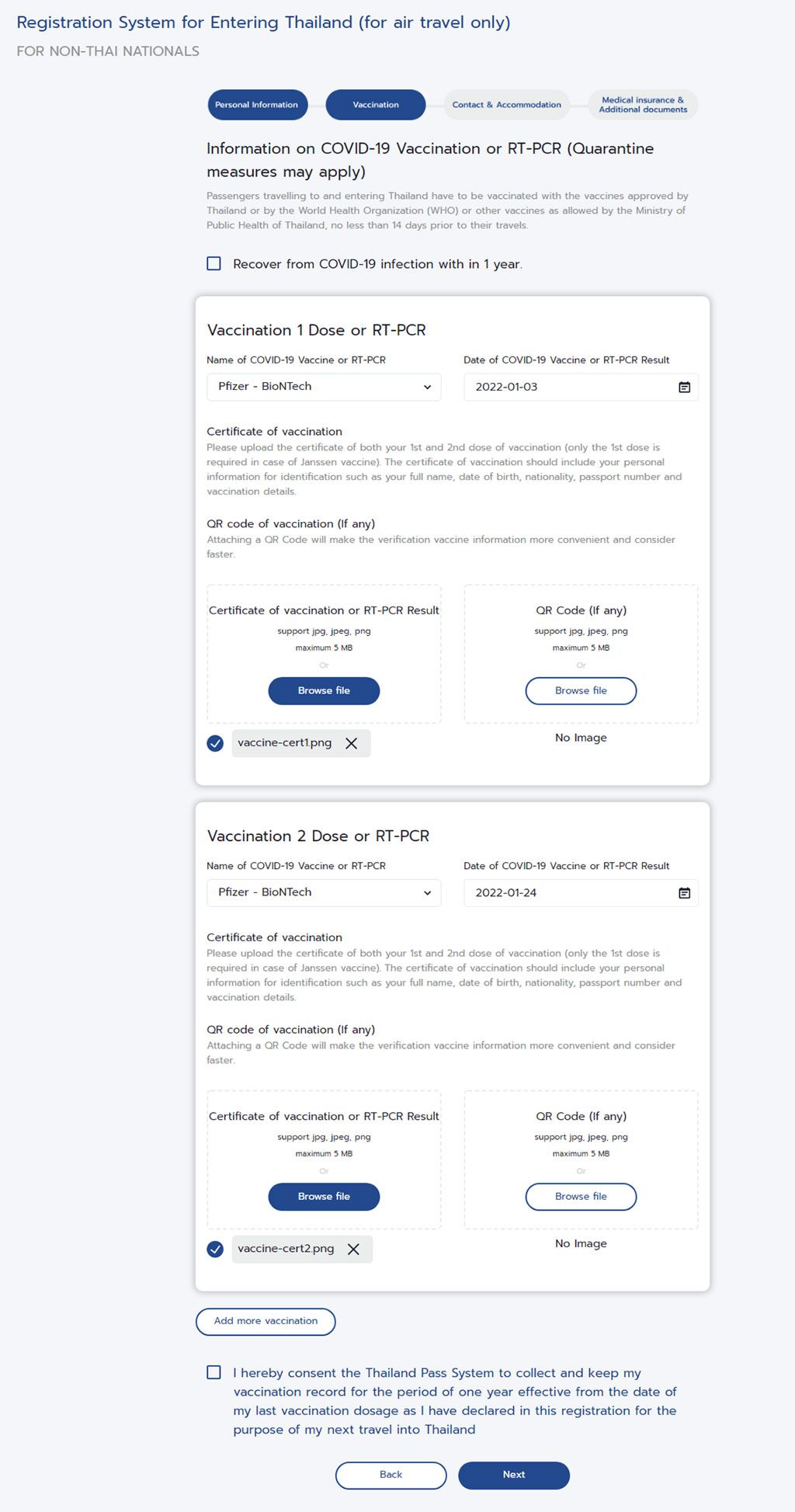
Step 5: Provide Your Hotel Details or Address in Thailand
In this part, you will be required to provide the details of your address in Thailand or your hotel reservation.
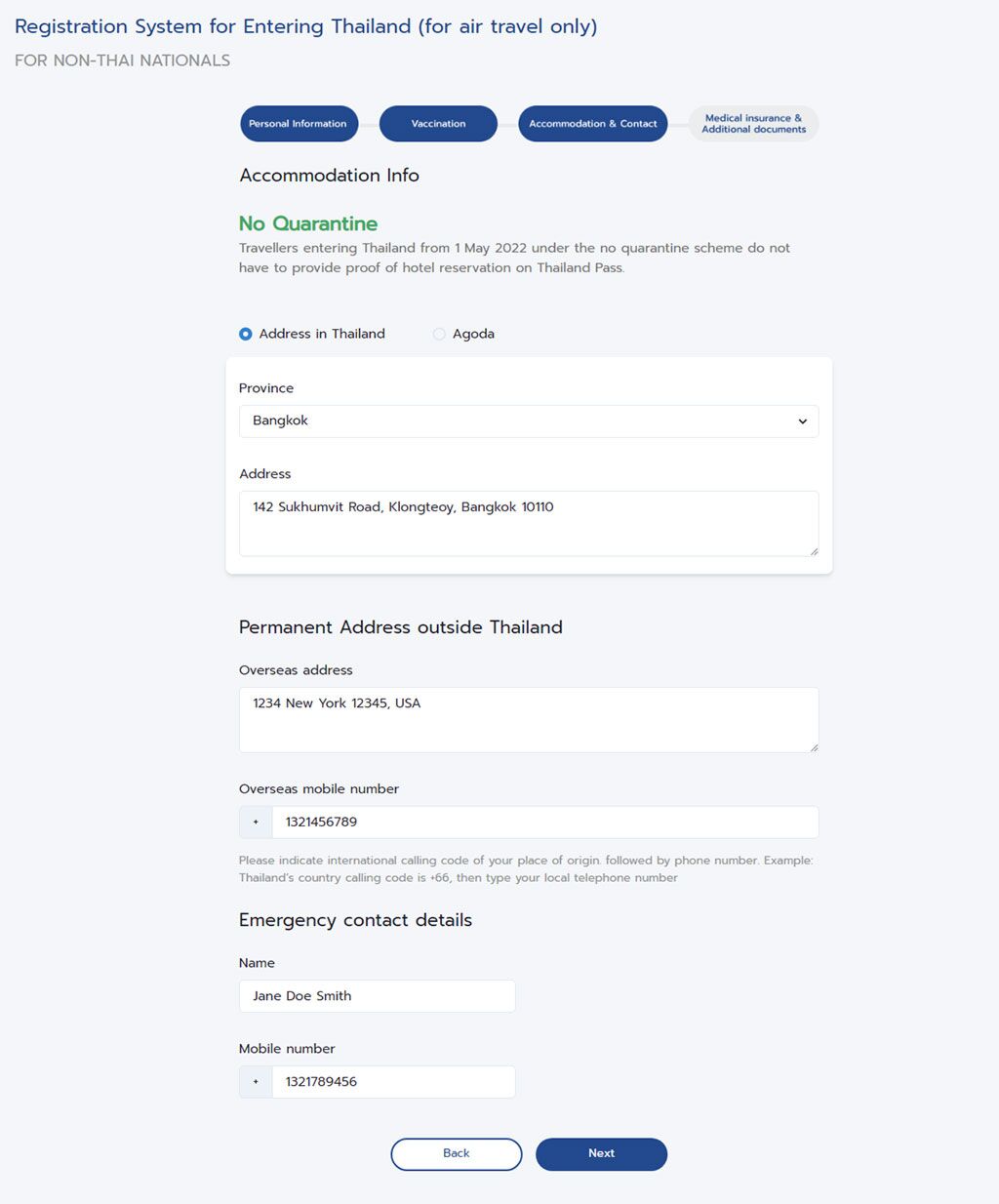
In this part, you will also provide your address in the country of departure, your contact number, your emergency contact person, and his or her contact number.
If you are staying in a Hotel, you can also validate your reservation if you booked through Agoda.com :
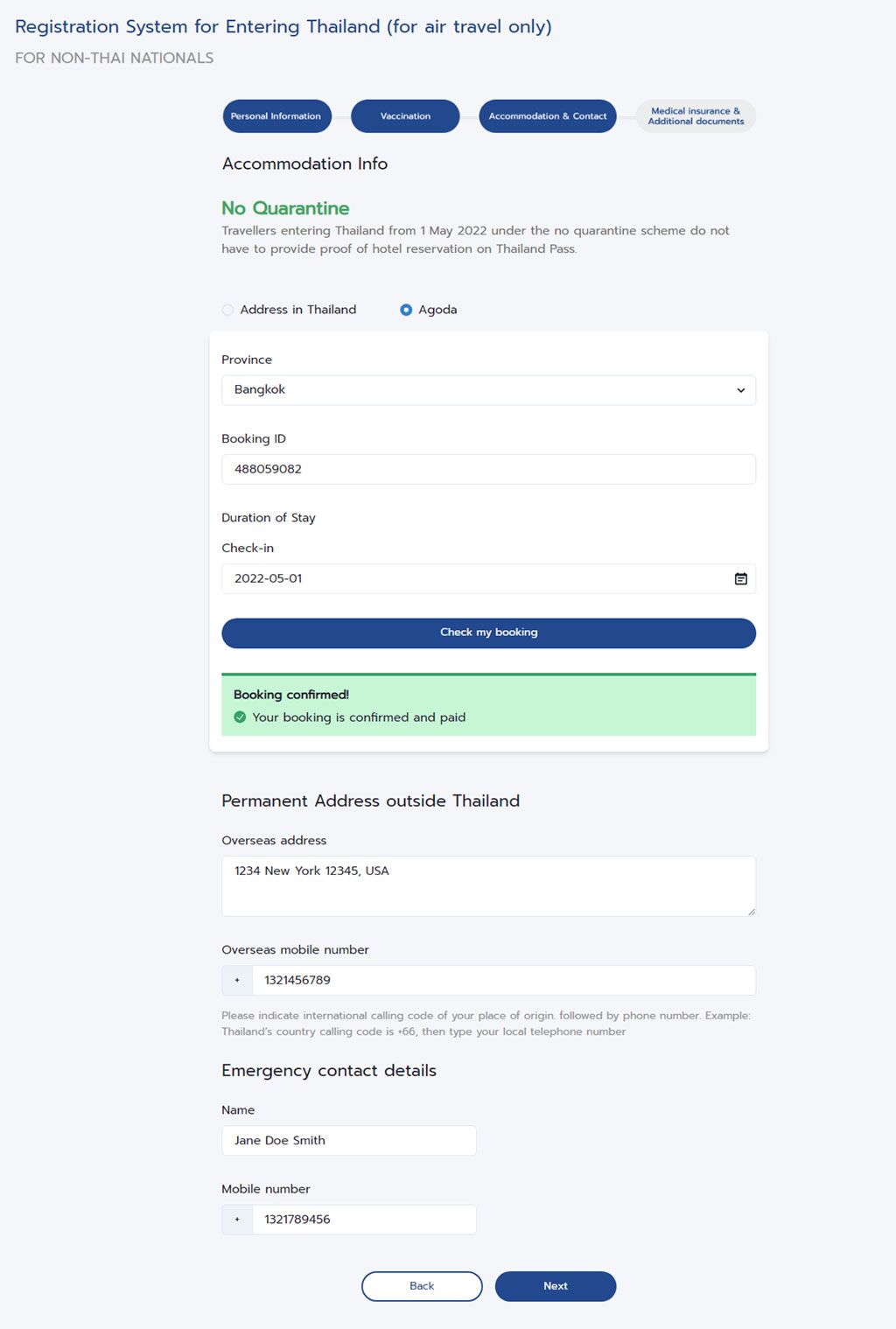
Step 6: Submit your COVID 19 Insurance
In this part, you will provide the COVID 19 Insurance. You must provide the policy number, and start date of the insurance policy and upload the one page document of your certificate of insurance. Based on experience, it is recommended to use AXA Thailand Insurance as it is the best insurance provider and they will issue a one-page document written specifically for your Thailand Pass application.
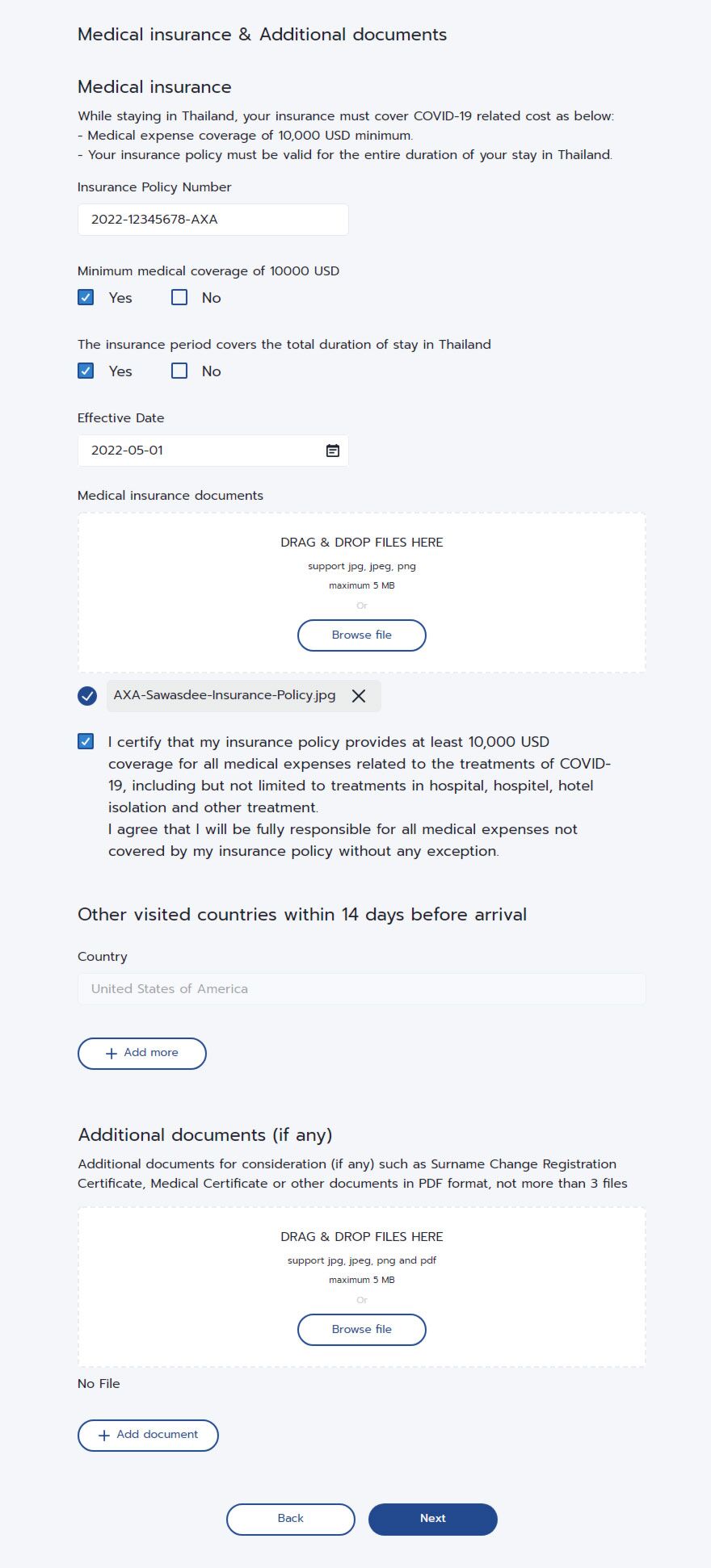
Step 7: Review the Summary of your Thailand Pass Application
This is the last part of the application process. You will have a summary of your application. Please check all information that you have provided and if everything is correct, you may submit the application.
You will then receive your 6-digit access code which will appear on your screen and it will also be sent to your registered email.
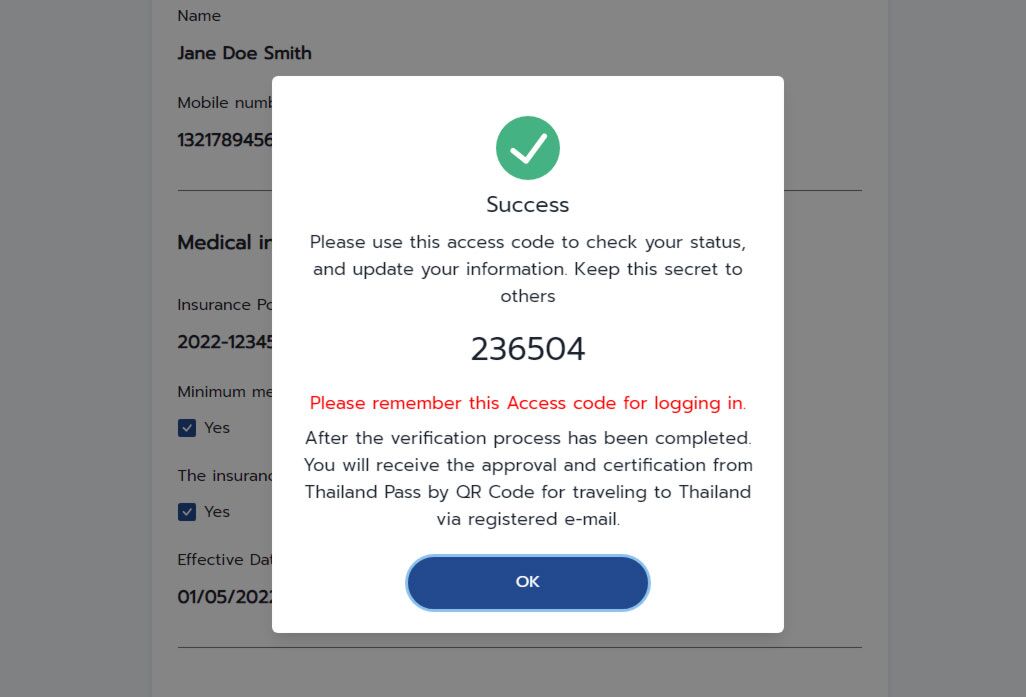
How to Check the Thailand Pass Status
To check the status of your Thailand Pass application, you may go to:
https://tp.consular.go.th/en/check-status
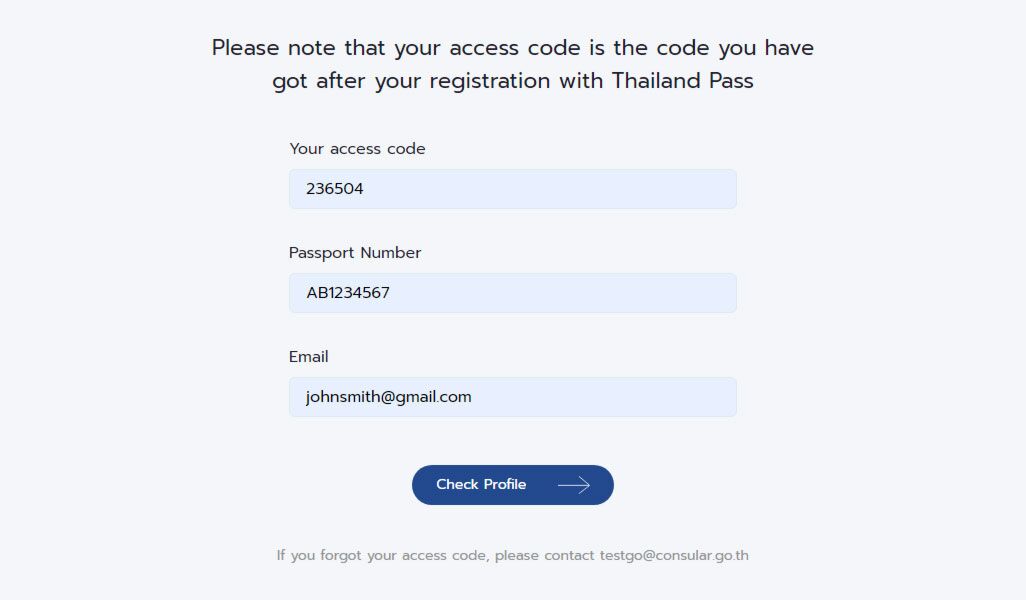
If Thailand Pass status states ‘Reviewing’, it means you need to wait a day or two for a result.
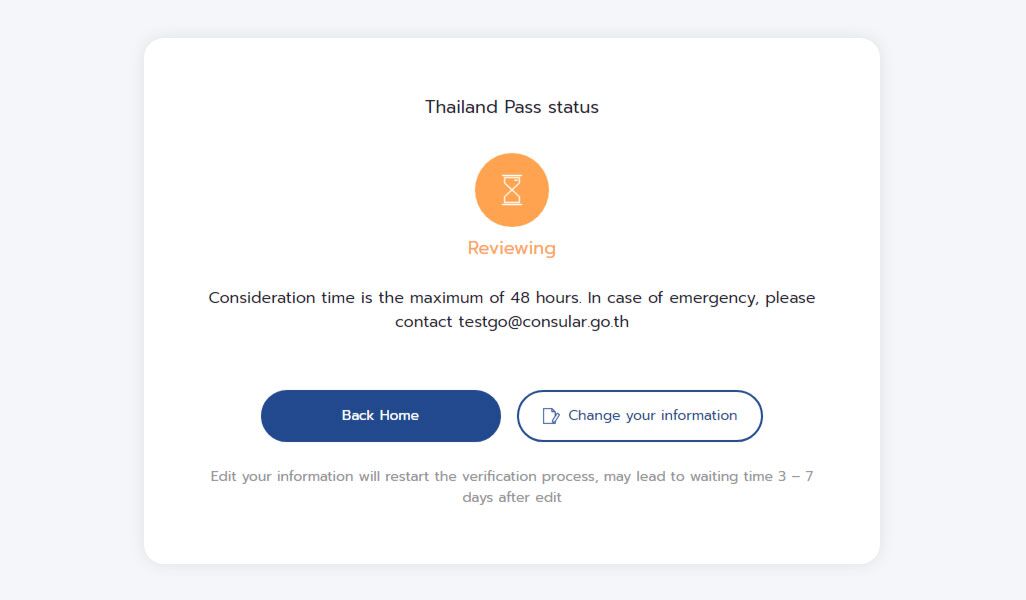
If Thailand Pass status states ‘Approved’, you can download the file or save it on your mobile phone.
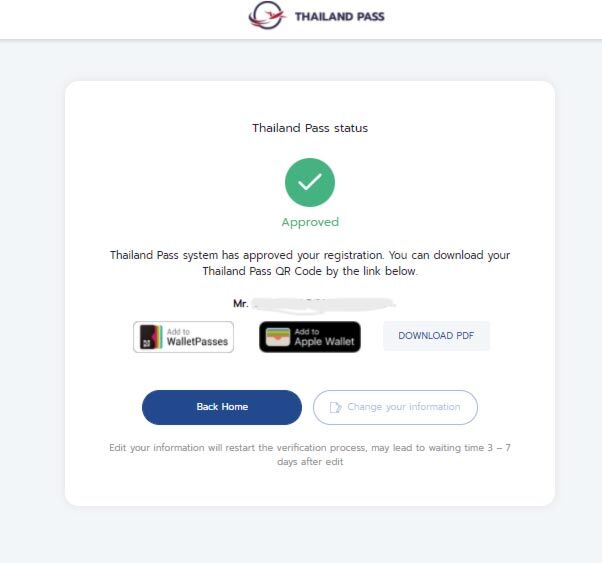
In case you are experiencing difficulty with the Thailand Pass system, you could also avail the professional services of Siam Legal International , a law firm in Thailand that will help you in your Thailand Pass application and therefore make it easy for you to get to the Land of Smiles.
New COVID Insurance Requirement for Thailand Pass
Starting May 1, 2022, the Thailand Pass requirement for the COVID Travel Insurance will be reduced to 10,000 USD from the previous 20,000 USD requirement. Insurance policies with 20,000 USD, 50,000 USD or 100,000 USD coverage will remain valid.
Based on experience, the common problem for Thailand Pass applications being rejected is that some insurance policies are not properly worded. Your COVID-19 insurance must expressly state that it covers up to 10,000 USD medical expenses including COVID-19 while in Thailand.
You may use your own health insurance or purchase insurance from your own country, however, it is recommended to purchase from an insurance company in Thailand such as AXA Insurance Thailand to make sure that you meet the requirement in obtaining the Thailand Pass successfully.
- Your certificate of insurance will expressly state that it covers up to 10,000 USD medical expenses including COVID-19. It will also state that the certificate is issued for the purpose of the Thailand Pass application.
- The AXA Sawasdee Thailand provides a one-page certificate of insurance which is perfect for the Thailand Pass application since the system will only allow one-page document to be uploaded.
- Your insurance letter or certificate will also contain the policy number and date of effectivity or start date.
- The AXA Insurance policy must be effective before or on the date of arrival and during your entire length of stay.
Important Notes When Buying Travel Insurance
- Avoid the insurance providers with COVID only coverage; they do not cover medical costs from accidents (like motorcycle accidents) or common unexpected illnesses (common fever or food poisoning).
- AXA Sawasdee Thailand covers medical expenses (outpatient and inpatient) due to accidents and illnesses including COVID-19.
- AXA Sawasdee Thailand also covers telemedicine and teleconsultation which may be required during the quarantine period of the patient.
To purchase AXA Thailand Insurance; the most reliable insurance that has never had any problem with the Thailand Pass application, please click the link below:
https://www.siam-legal.com/axa-insurance

Book Your Thailand Hotel on Agoda.com
Recommended hotels in bangkok.
To assist travelers in planning their trip to Thailand, we have compiled a list of highly recommended Bangkok Hotels:
- The Okura Prestige Bangkok
- Park Hyatt Bangkok
- DoubleTree by Hilton
- Hilton Sukhumvit Bangkok
- The Landmark Bangkok
- Sofitel Bangkok Sukhumvit
- Carlton Hotel Bangkok
- The Continent Hotel Asok
- Bangkok Marriott Marquis
- Holiday Inn Bangkok Sukhumvit
- Chatrium Hotel Riverside
- Shangri-La Bangkok
- Anantara Riverside Bangkok
- Vie Hotel Bangkok
- Millennium Hilton Bangkok
- Avani+ Riverside Bangkok
- Le Meridien Bangkok
- Lebua at State Tower
- Grand Hyatt Erawan Bangkok
- Courtyard by Marriott Bangkok
Recommended Hotels in Phuket
To assist travelers in planning their trip to Thailand, we have compiled a list of highly recommended hotels in Phuket:
- The Marina Phuket Hotel
- Naina Resort and Spa
- Patong Resort Hotel
- Crest Resort and Pool Villas
- Baan Laimai Beach Resort
- Andamantra Resort and Villa Phuket
- Andakira Hotel
- Phuket Graceland Resort and Spa
- The Royal Paradise Hotel and Spa
- Hilton Phuket Arcadia Resort and Spa
- Deevana Patong Resort and Spa
- Four Points by Sheraton Phuket Patong Beach Resort
- Baan Yuree Resort and Spa
- The Nature Phuket
- The Blue Hotel
- Rawai Palm Beach Resort
- Phuket Marriott Resort and Spa, Nai Yang Beach
- Phuket Marriott Resort & Spa, Merlin Beach
- Navatara Phuket Resort
- Kalima Resort & Spa
Siam Legal Visa and Thailand Pass Assistance
Package 1: 200 usd (visa + thailand pass).
- Visa Consultation
- Extensive checklist of required documents
- Assistance in Thai e-visa application (non-immigrant O marriage visa and 60-day TR visa)
- Assistance in Thailand Pass application
- 2 to 3 weeks process
- Our offer is available in the US, UK, and Canada visa applications only

Package 2: 100 USD (Thailand Pass)
- Consultation with our Immigration Specialist
- Assistance in Thailand Pass application (including Visa holders and Visa Exemption)
- 5 to 10 days processing time
- Available in eligible countries only
- Available for Thai and foreign nationals
- For Test & Go, Sandbox, and Quarantine programs

For the latest information, weekly updates, and guide on How To Travel to Thailand in 2022 , you may check this page here:
https://www.thaiembassy.com/thailand-travel-restrictions-updates

Related Posts
Thailand travel restrictions for august 2023.
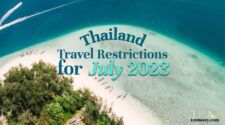
Thailand Travel Restrictions for July 2023
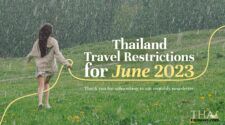
Thailand Travel Restrictions for June 2023
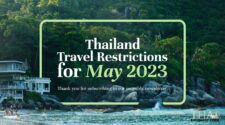
Thailand Travel Restrictions for May 2023

COMMENTS
For up-to-date information and weekly updates regarding current Thailand travel restrictions, please visit the Weekly Updates for Thailand Travel Restrictions. As of October 1, 2022, Thailand will no longer have COVID entry requirements. Please exercise normal precautions as necessary when visiting Thailand.
The COVID-19 pandemic wreaked havoc on the world. International travel ground to a halt and countries were forced to implement strict processes and entry requirements to halt the spread of the virus. Thailand introduced quarantine measures and Thailand Pass. Thailand Pass required visitors to register details like vaccination status, flight, and hotel bookings, and confirmation
No more 7-day quarantine as Thailand encourages vaccinated tourists to return. Thailand is resuming its Test-and-Go tourism plan from February, which means that fully vaccinated visitors can bypass seven-day quarantine and travel to any part of Thailand, provided they take a negative COVID-19 test on the first and fifth day of their visit.
Travel to Thailand in July 2022. July 11, 2022. Thailand has removed the requirement for Thailand Pass registration for all travelers. Travelers, both Thais, and foreigners entering Thailand, will only be required to show Proof of Vaccination or COVID-19 test results. For vaccinated adults and their children, proof of vaccination of the parent ...
Last updated: May 17, 2023. The CDC's Order requiring proof of vaccination for non-U.S. citizen nonimmigrants to travel to the United States is no longer in effect. For more information see Requirement for Proof of COVID-19 Vaccination for Air Passengers. Check the CDC website for additional information and Frequently Asked Questions.
From 1 May 2022, travelers entering Thailand by air will be subject to new entry measures, as follows; 1. Fully Vaccinated Persons must : - Register on Thailand Pass. - Attach required documents including passport, certificate of vaccination. - Attach proof of insurance with at least 10,000 USD coverage for medical treatments in Thailand (for ...
Thailand entry details and exceptions. Effective January 9 to January 31, 2023 - Travelers (aged 18 years old and above) arriving in Thailand must have proof of vaccination; or proof of recovery from COVID in the last 6 months; or you may also provide a vaccine-exemption letter from a doctor stating you cannot receive a COVID vaccine due to ...
Thailand has relaxed its quarantine restrictions and is reopening to vaccinated travelers arriving from several dozen countries and territories, providing a much-needed boost for the country's ...
The basics. Thailand has recorded more than 32,000 deaths and over 4.67 million cases of Covid-19 as of September 26, 2022. On average, around 700 Covid-19 cases are reported per day. On July 1 ...
The basics. Thailand has recorded more than 32,000 deaths and over 4.67 million cases of Covid-19 as of September 26, 2022. On average, around 700 Covid-19 cases are reported per day. On July 1 ...
Thailand Travel Restrictions 2022 (Updated May 25, 2022) Latest updates on Thailand Pass Top 20 Questions on Thailand Pass How to Travel to Thailand in 2022 Thailand Travel Restrictions Join our Facebook Group Best COVID Insurance for Thailand Test and Go Thailand (March 2022) Test and Go Hotels in Thailand Test and Go Hotels in
To learn more about the new entry requirements, please visit: Thailand Travel Restrictions for May 1. Thailand Pass is still required for all travelers to Thailand. Any proposal to ease the current entry requirements for Thailand will be discussed by CSSA on May 20, 2022. For up-to-date information and weekly updates regarding current Thailand ...
U.S. Citizens with emergencies, please call 02-205-4000. Outside of Office Hours, contact: 02-205-4000. Outside of Thailand: +66-2-205-4000. International Parental Child Abduction. Arrest of a U.S. Citizen. Death of a U.S. Citizen. Victims of Crime. Emergency Financial Assistance. Passports & Citizenship.
Thailand has reported more than 1.7 million confirmed Covid cases since the pandemic began, with nearly 18,000 deaths, according to America's Johns Hopkins University. This video can not be played
Read the country information page for additional information on travel to Thailand. If you decide to travel to Thailand: Enroll in the Smart Traveler Enrollment Program (STEP) to receive Alerts and make it easier to locate you in an emergency. Follow the Department of State on Facebook and Twitter. Review the Country Security Report for Thailand.
Call us in Washington, D.C. at 1-888-407-4747 (toll-free in the United States and Canada) or 1-202-501-4444 (from all other countries) from 8:00 a.m. to 8:00 p.m., Eastern Standard Time, Monday through Friday (except U.S. federal holidays). See the State Department's travel website for the Worldwide Caution and Travel Advisories.
For the first time in over 15 months, Thailand's popular resort island of Phuket is allowing vaccinated international travelers to enter without quarantine restrictions. CNN values your feedback 1.
Thailand has announced it is tightening some entry restrictions while expanding its "sandbox" quarantine program, and has urged people to follow social distancing and mask rules to control the spread of COVID-19 fueled by the omicron variant. ... He said travel restrictions imposed on eight African countries will also be lifted that day ...
2:24. Thailand will consider scrapping a mandatory polymerase chain reaction test on arrival for foreign visitors as the Southeast Asian nation further relaxes its visa rules to attract tourists ...
What Is the XBB.1.5 Covid Variant and Why It's Prompting Concern. The reintroduction of entry requirements aimed at stemming the spread of Covid-19 comes as China rapidly dismantles its zero ...
This Weekly Update was originally posted on April 29, 2022. For the most recent update, click here. To sign-up for our Weekly Updates, please click here. Thailand Travel Updates for May 1, 2022 Thailand is easing its entry requirements and Thailand Pass process from the 1st of May, 2022. How a traveler enters Thailand will